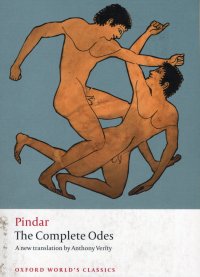 Ah, gentle reader, this is the best book with two peepees on the front cover that I have ever read. Hopefully, gentle reader, this is the only book with two peepees on it that I own, but given that I own a lot of classical Greek and Roman literature, one cannot be sure.
Ah, gentle reader, this is the best book with two peepees on the front cover that I have ever read. Hopefully, gentle reader, this is the only book with two peepees on it that I own, but given that I own a lot of classical Greek and Roman literature, one cannot be sure.
This book, which I bought earlier this year, contains poems praising the victors at assorted Greek game festivals circa 2600 BC, including the Olympic games but others of across (what would become) Greece. Many of them include some lineage of the victors, some tracing their past to gods, and in doing so, Pindar includes some bits of myths and stories as he name checks gods, heroes, and ancient leaders in the fashion of a rap track calling out or calling out to other rappers. The book itself has end notes in the, well, end, but without any markers for end notes in the poems themselves. It made for easier reading in the moment as one was not constantly dropping eyes to the footnotes or flipping to the back, which made things smooth for me as I just let the things roll over me, but they were there if I needed to look things up to make connections to other works or for a paper.
I’m not sure what liberties the translator might have taken with the text–probably not too much, as we’re not steeped in 2007-era slang (although someone does, indeed, have some truck or not with something), but the poems in addition to praise for athletes and gods, includes some insights into the human condition which I noted and will henceforth have quoted.
From “Olympian 2”:
But when some deed has been done, right or wrong,
not even Time the father of all things can undo its outcome;
yet with the help of good fortune men may forget it.
Grief dies when confronted with noble joys,
and its enduring bitterness is beaten down
when fortune sent from a god
lifts a man to prosperity’s heights.
From “Olympian 5”:
If a man waters healthy prosperity
and is content with a sufficiency of possessions,
and adds to his good repute,
he should not strive to become a god.
From “Olympian 6”:
Success without labour is not honoured among men,
either on land or in hollow ships;
but if noble deeds are accomplished through toil,
many people remember them.
From “Pythian 1”:
If you should speak in keeping with the occasion,
plaiting the threads of many matters into a brief whole,
men will find less fault with you;
for wearisome excess blunts the edge of keen expectancy,
and in their secret hearts men are especially oppressed
when they hear praise of other citizens.
Nevertheless, since it is better to be envied than pitied,
do not deviate from your noble course.
Steer your people with the rudder of justice,
and forge your tongue on the anvil of truth.
From “Pythian 3”:
If a man holds to the path of truth in his mind
he must be content with whatever the blessed gods send him.
Gusts of soaring winds blow now this way, now that;
lasting prosperity does not visit men for long,
even when it has attended them with all its weight.
I shall be small when times are small, and great when they are great.
Whatever fortune comes my way I shall respect it with my mind
and nurture it according to my powers.
From “Nemean 3”:
It is by inborn distinction that a man gains authority,
while he who has only been taught is a man of shadows;
he veers further and thither, and never enters the arena with a confident step,
trying out thousands of exploits in his futile mind.
From “Nemean 4”:
And yet, though the deep salt sea grips you by the waist,
hold out against its scheming; we shall enter the contest
in full daylight, far stronger than our adversaries,
while another man, with envy in his eyes,
pours out his empty opinions in darkness,
and they fall to the ground.
Honestly, it’s almost proto-stoic. I’d have to dig into my notes from the part of the first of the volumes of Copleston’s The History of Philosophy (being I only got a couple of chapters into the first paperback in the series, I only have notes on the early Greeks) to see who might have influenced Pindar.
Of course, were I that sort of fellow, I probably would have read the end notes. Or more of The History of Philosophy for that matter. Or even The Story of Philosophy by the Durants which I have around here somewhere.
Also, I want to share that I know what pankration means; it’s ancient Greek MMA. You can be sure that I am working this into conversations as often as possible. This behavior might explain why so few have conversations with me.


